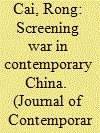| Srl | Item |
| 1 |
ID:
124646


|
|
|
|
|
| Publication |
2013.
|
| Summary/Abstract |
This article focuses on the adaptation of the Red Classics - a collection of literary and cinematic works depicting the Communist armed struggle produced in the PRC between 1949 and 1966 - for contemporary Chinese television. Using the controversy over the remake of Tracks in the Snowy Forest (Linhai xueyuan ????) as a case study, it explores the complexity of restaging the Communist revolution in the post-Mao reform era. Competition in the media industry compels TV producers to re-package Communist history for fragmented contemporary audiences - those who are familiar with the original Red Classics as well as those who grew up in the reform era and who are far removed from the revolutionary legacy. Adaptation of the Red Classics is a sensitive issue. By focusing on the sexual desires and individual interests muted in the original Red Classics in order to cater for the tastes of younger viewers, the remakes offer alternative readings of history and have incurred government censorship. Opposition to the adaptations has also come from a distinct mnemonic community, the Red memory group, whose members came of age in either the 1960s or during the Cultural Revolution and who absorbed the Red Classics in their formative years. The interplay of state politics, collective memory and commercial imperatives ultimately makes the repackaging of the revolution for contemporary mass entertainment a multifaceted and highly contentious issue.
|
|
|
|
|
|
|
|
|
|
|
|
|
|
|
|
| 2 |
ID:
160843


|
|
|
|
|
| Summary/Abstract |
War has been a prominent theme in cultural productions of the People’s Republic of China (PRC). Repeated representations by the socialist cinema and beyond have produced a revolutionary imagination of war that glorifies death and sacrifice, subsuming individual experience of pain and loss under the discourse of the Communist nation-building. This article focuses on a revisionist reading of the revolutionary imagination of war in Feng Xiaogang’s 2007 New Year Film The Assembly. It has a dual focus. First, it discusses the genre practice of war film in the mainland cinema and the relation among war film, representation of violence, heroism, and nation building. Then it examines how Feng’s visceral depiction of combat redirects the focus from the master narrative of nation-building to the individual. Second, focusing on the main character’s quest for honor for his fallen soldiers, this article explores how the film critiques the power structure of the revolutionary honor system that valorizes the revolutionary imagination of war. Ultimately, the discussion proves that the film is as much a confirmation of the revolutionary nation-building as a poignant critique and subversion of the official vision of honor and history.
|
|
|
|
|
|
|
|
|
|
|
|
|
|
|
|